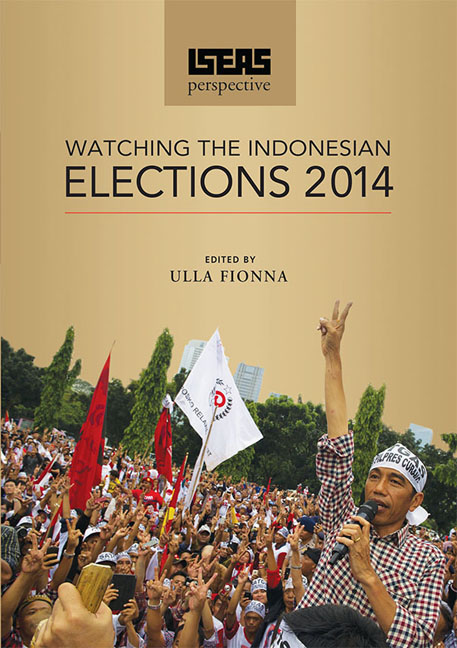Book contents
- Frontmatter
- Contents
- Foreword
- Introduction
- 1 The Gubernatorial Race in Jakarta: Background and Implications
- 2 Indonesian Parties Struggle for Electability
- 3 Who Will Be Indonesian President in 2014?
- 4 Indonesian Presidential Election Forcing Rejuvenation of Parties
- 5 Resisting Democracy: Front Pembela Islam and Indonesia's 2014 Elections
- 6 Getting to Know the Contestants of the 2014 Indonesian Parliamentary Elections
- 7 A Snapshot of the Campaigning in Indonesia's 2014 Legislative Elections
- 8 Unpacking the Results of the 2014 Indonesian Legislative Elections
- 9 Indonesia's 2014 Legislative Elections: The Dilemmas of “Elektabilitas” Politics
- 10 The Islamic Factor in the 2014 Indonesian Elections
- 11 Vote-buying in Indonesia's 2014 Elections: The Other Side of the Coin
- 12 Gap Narrows Between Candidates in Indonesian Presidential Elections
- 13 Analysing the Economic Platforms in the Indonesian Presidential Election
- 14 Indonesian Islamic Parties After the 2014 Elections: Divided and Self-Centred
- 15 Safeguarding Indonesia's Pluralism: An Essential Task for Joko Widodo
- 16 Jokowi's Key Economic Challenge: Improving Fiscal Policy for Equitable Growth
- 17 Crossing the River While Avoiding the Stones: Jokowi's Run-up to the Presidency
- 18 Post-elections Indonesia: Towards a Crisis of Government?
- Epilogue: Jokowi's First Months: Compromise Cabinet, Subsidy Cuts, and Corrupt Coalition
14 - Indonesian Islamic Parties After the 2014 Elections: Divided and Self-Centred
Published online by Cambridge University Press: 29 July 2017
- Frontmatter
- Contents
- Foreword
- Introduction
- 1 The Gubernatorial Race in Jakarta: Background and Implications
- 2 Indonesian Parties Struggle for Electability
- 3 Who Will Be Indonesian President in 2014?
- 4 Indonesian Presidential Election Forcing Rejuvenation of Parties
- 5 Resisting Democracy: Front Pembela Islam and Indonesia's 2014 Elections
- 6 Getting to Know the Contestants of the 2014 Indonesian Parliamentary Elections
- 7 A Snapshot of the Campaigning in Indonesia's 2014 Legislative Elections
- 8 Unpacking the Results of the 2014 Indonesian Legislative Elections
- 9 Indonesia's 2014 Legislative Elections: The Dilemmas of “Elektabilitas” Politics
- 10 The Islamic Factor in the 2014 Indonesian Elections
- 11 Vote-buying in Indonesia's 2014 Elections: The Other Side of the Coin
- 12 Gap Narrows Between Candidates in Indonesian Presidential Elections
- 13 Analysing the Economic Platforms in the Indonesian Presidential Election
- 14 Indonesian Islamic Parties After the 2014 Elections: Divided and Self-Centred
- 15 Safeguarding Indonesia's Pluralism: An Essential Task for Joko Widodo
- 16 Jokowi's Key Economic Challenge: Improving Fiscal Policy for Equitable Growth
- 17 Crossing the River While Avoiding the Stones: Jokowi's Run-up to the Presidency
- 18 Post-elections Indonesia: Towards a Crisis of Government?
- Epilogue: Jokowi's First Months: Compromise Cabinet, Subsidy Cuts, and Corrupt Coalition
Summary
INTRODUCTION
The recently concluded 2014 legislative and presidential elections highlight the continuing importance of Islamic political parties in Indonesian politics. The parties collectively managed to obtain nearly 32 per cent of the vote share in the national legislative election conducted last April. Out of the five Islamic parties contesting, four supported Prabowo Subianto's presidential candidacy, while only one backed Joko Widodo (Jokowi's). What are the roles these parties will play in the new Indonesian government, now that Jokowi is officially the winner of the presidential election and will be inaugurated as Indonesia's new president on 20 October 2014?
The first section of this article reviews the electoral achievements of Islamic political parties in April's legislative election and the ideological and interest-based differences between these parties. The next section analyses the four largest Islamic parties — the National Awakening Party (PKB), the National Mandate Party (PAN), the Prosperous Justice Party (PKS), and the United Development Party (PPP), discussing whether they will be represented in Jokowi's cabinet, and whether they will likely support or oppose his policy on religious affairs. The final section concludes with some observations on the intermediate prospect of Islamic parties in the new administration.
ELECTORAL RESULTS AND POLITICAL DIVISIONS
Table 1 shows how the five Islamic parties did who competed in the April 2014 legislative election. Collectively, they obtained 31.41 per cent of all the votes cast, surpassing the 25.90 per cent combined vote share they obtained in the 2009 legislative election, which no doubt was a record low for the Islamic parties in post-reformasi Indonesian elections.
The unexpectedly strong results achieved by the five Islamic parties made some observers wonder about the potentially influential role Islam might have in future Indonesian politics, more specifically, whether it would lead to a stronger push for Islamist agendas — most possibly further restrictions on morality-related matters.
However, this possibility is elusive since the Islamic parties are so divided based on their respective ideologies and political interests. Ideologically, the parties are divided over the interpretation of Islamic teachings and their application in Indonesian society. For instance, PKS is widely believed to support stricter interpretations of Islamic law within Indonesian society and some of its politicians have condoned actions by radical Islamic groups that persecute members of religious minorities.
- Type
- Chapter
- Information
- ISEAS PerspectiveWatching the Indonesian Elections 2014, pp. 123 - 136Publisher: ISEAS–Yusof Ishak InstitutePrint publication year: 2015



